
Policy Journal Issue No.1
Released: 2025
The launch of this first issue of the NAR Policy Journal represents a significant milestone in consolidating and sharing knowledge on governance-related matters.
Designed as a biannual publication, the Policy Journal serves as a dynamic repository for rigorous research and
thoughtful policy recommendations, offering practical solutions to emerging governance challenges.
Each paper within this inaugural issue emerges from meticulous assessment, enriched with diverse insights gathered from citizens' forums and debate spaces, thus ensuring community voices and priorities remain at the forefront of governance discourse throughout Rwanda.
Situation in Eastern DRC
Released: July 2022
More than a month after the summit of Heads of State of the East African Community held in Nairobi on 20 June 2022, the Regional Force has still not been deployed. We recall that a deterioration of the situation in the Eastern DRC could have potentially disastrous effects for the entire Great Lakes region. In an already tense and potentially explosive environment, we urged all parties involved in the DRC situation to exercise restraint.
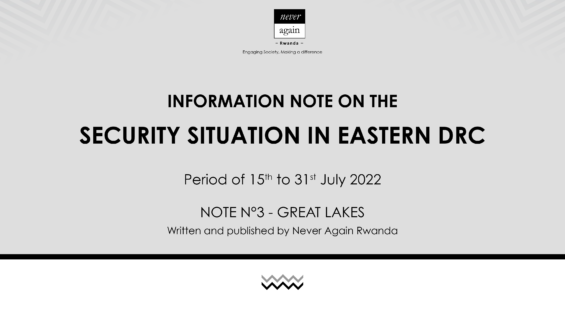
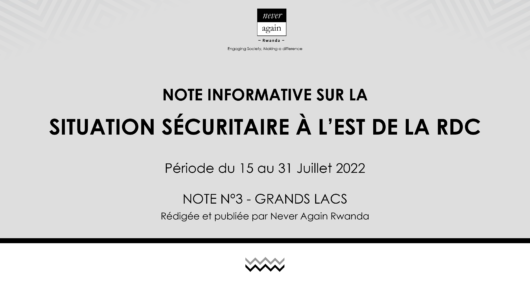
Situation Sécuritaire à l'est de la RDC
Sortie : Juillet 2022
Plus d'un mois après le sommet des chefs d'État de la Communauté de l'Afrique de l'Est tenu à Nairobi le 20 juin 2022, la Force régionale n'a toujours pas été déployée. Nous rappelons qu'une détérioration de la situation dans l'Est de la RDC pourrait avoir des effets potentiellement désastreux pour toute la région des Grands Lacs. Dans un environnement déjà tendu et potentiellement explosif, nous avons exhorté toutes les parties impliquées dans la situation en RDC à faire preuve de retenue.
Situation in Eastern DRC
Released: July 2022
The security situation in Eastern DRC continues to deteriorate, worsening the diplomatic tensions between the Democratic Republic of Congo and Rwanda, which triggers a potential effect of the crisis on other countries in the region. This is triggered by the proliferation of message of hate speech and fragile social cohesion. This note is meant to urge all parties to act swiftly, to avoid pushing the region into an endless cycle of instability and conflict.
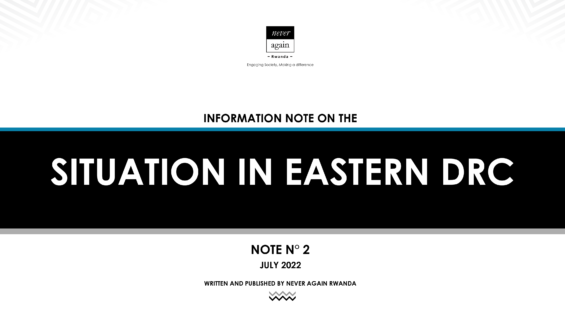
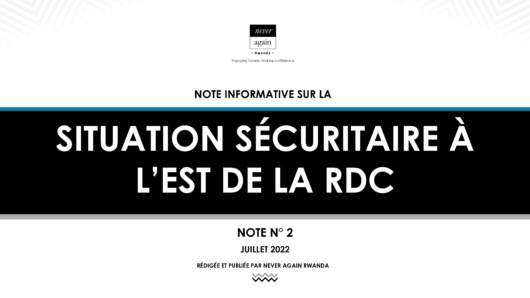
Situation Sécuritaire à l'est de la RDC
Sortie : Juillet 2022
La situation sécuritaire dans l'Est de la RDC continue de se détériorer, aggravant les tensions diplomatiques entre la République démocratique du Congo et le Rwanda, ce qui déclenche un effet potentiel de la crise sur d'autres pays de la région. Ceci est déclenché par la prolifération des messages de discours de haine et la fragile cohésion sociale. Cette note vise à exhorter toutes les parties à agir rapidement, pour éviter de plonger la région dans un cycle sans fin d'instabilité et de conflits.
Information Note on Hate Speech
Released: June 2022
Recent years have seen a spike in hate speech and violence against Rwandans and Congolese Tutsis in the DRC. This note is meant to raise the awareness of all actors working in the Great Lakes region and their partners on the danger of spreading hate messages, and incitement to violence in a region where armed conflict remains a threat. The note calls on all the key players to play a decisive role in putting an end to the messages of hatred and incitement to violence and collectively promote and consolidate social cohesion.

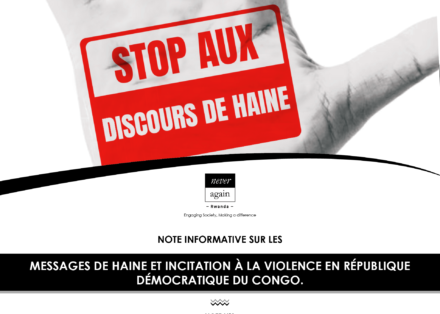
Note d'information sur le discours de haine
Sortie : Juin 2022
Ces dernières années ont vu une recrudescence des discours de haine et de la violence contre les Rwandais et les Tutsis congolais en RDC. Cette note vise à sensibiliser l'ensemble des acteurs travaillant dans la région des Grands Lacs et leurs partenaires sur le danger de la diffusion de messages de haine et d'incitation à la violence dans une région où les conflits armés demeurent une menace. La note appelle tous les acteurs clés à jouer un rôle décisif pour mettre fin aux messages de haine et d'incitation à la violence et promouvoir et consolider collectivement la cohésion sociale.


